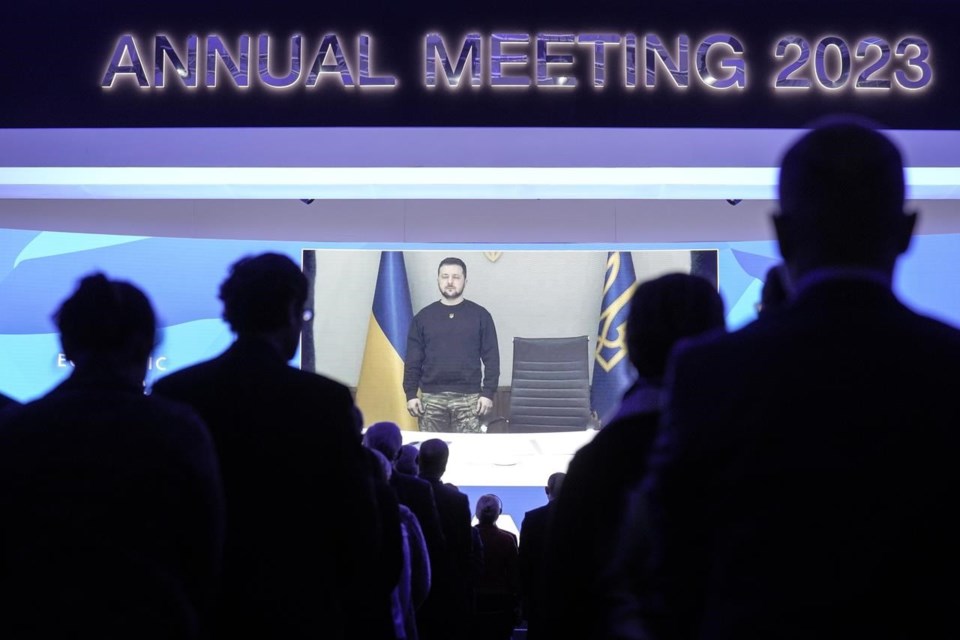DAVOS, Switzerland (AP) — Ukrainian President Volodymyr Zelenskyy told political leaders at the World Economic Forum meeting in Davos that supplies of Western weapons must come quicker than Russia’s attacks, urging the world to move faster because “tragedies are outpacing life; the tyranny is outpacing democracy.”
Zelenskyy, speaking by video link from Kyiv, said the world needs to react more rapidly to challenges like global security, climate change, hunger and energy, warning that in the war, “the time the free world uses to think is used by the terrorist state to kill."
He said his allies must not hesitate: “The supplying of Ukraine with air defense systems must outpace Russia’s vast missile attacks. The supplies of Western tanks must outpace another invasion of Russian tanks.”
Zelenskyy's spoke after U.N. Secretary-General Antonio Guterres described the world as being in a “sorry state" because of interlinked challenges including climate change and Russia's war in Ukraine that are “piling up like cars in a chain reaction crash.”
The gloom hung on the second day of the elite gathering of world leaders and corporate executives in the Swiss ski resort of Davos after a helicopter crashed into a kindergarten in Ukraine, killing more than a dozen people, including Ukraine’s interior minister.
Zelenskyy stood and asked for a moment of silence for the victims. There was no immediate word on the cause of the crash, but he said that “every individual, every death is a result of war.”
His wife, first lady Olena Zelenska, earlier called it “another very sad day,” dabbing teary eyes, then telling Davos attendees that “we can also change this negative situation for the better."
The Ukrainian delegation to Davos, including Zelenska, has been pushing for more aid, including increasingly advanced weapons, from international allies to fight Russia.
Shortly before Zelenskyy spoke, German Chancellor Olaf Scholz reiterated that Germany was one of the top suppliers of military equipment to Ukraine when asked why he had not sent tanks to the war-torn country.
While Germany has provided air-defense systems and armored personnel carriers, Scholz — the only leader to attend Davos from the Group of 7 biggest economies — is facing increasing pressure to send Leopard 2 battle tanks to help Ukraine.
“We will continue to support Ukraine – for as long as necessary,” Scholz said.
NATO Secretary-General Jens Stoltenberg said Ukraine’s Western backers this week will discuss ways to supply heavier and more advanced weapons.
“The main message there will be: more support, more advanced support, heavier weapons and more modern weapons,” Stoltenberg said of a gathering in Germany of top defense officials, including U.S. Defense Secretary Lloyd Austin, who work to coordinate military contributions to Ukraine.
“This is a fight for our values, this is a fight for democracy — and we just have to prove that democracy wins over tyranny and oppression,” the NATO leader added.
Meanwhile, Guterres said the “gravest levels of geopolitical division and mistrust in generations” are undermining efforts to tackle global problems, including widening inequality, a cost-of-living crisis sparked by soaring inflation and an energy crunch, lingering effects of the COVID-19 pandemic, supply-chain disruptions and more.
The U.N. chief singled out climate change as an “existential challenge,” and said a global commitment to limit the Earth's temperature rise to 1.5 degrees Celsius “is nearly going up in smoke.”
Guterres, who has been one of the most outspoken world figures on climate change, referenced a recent study that found scientists at Exxon Mobil made remarkably accurate predictions about the effects of climate change as far back as the 1970s, even as the company's stance publicly raised doubts about whether global warming was real.
“We learned last week that certain fossil fuel producers were fully aware in the 1970s that their core product was baking our planet," he said in his speech. “Some in Big Oil peddled the big lie.”
Critics have questioned the impact of the four-day meeting where politicians, CEOs and other leaders discuss the world’s problems — and make deals on the sidelines — but where concrete action is harder to measure. Environmentalists, for example, slam the carbon-spewing private jets that ferry in bigwigs to an event that prioritizes the battle against climate change.
Government officials, corporate titans, academics and activists attended dozens of panel sessions Wednesday on topics covering the metaverse, environmental greenwashing and artificial intelligence.
Ukraine has taken center stage as the anniversary of the start of the war nears. When Zelenskyy was asked about engaging in a dialogue with Russia, he said that “they will have to recognize their own mistakes, they will have to recognize Ukrainian statutes and they will have to really respect our territorial integrity."
NATO's leader says supplying Ukraine more equipment long term will help force Russian President Vladimir Putin to negotiate.
“It is very dangerous to underestimate Russia,” Stoltenberg warned. “Weapons — they are the way to peace” but they must come quickly.
Zelenskyy has daily pleaded for more advanced weapons, escalating his requests as Russia introduces new tactics and weapons against the much smaller Ukrainian army. Western countries have heeded the calls, although often with a delay and not in the number sought.
Guterres was not optimistic that the conflict being waged less than 1,000 kilometers (620 miles) from Davos would end soon.
“I do not see the end of the war in the immediate future,” he said. Deep historical differences between Russia and Ukraine make it more difficult to find a solution based on international law and that respects territorial integrity, he added.
"For the moment, I don’t think that we have a chance to promote or to mediate a serious negotiation to achieve peace in the short term," Guterres said.
___
AP journalists Masha Macpherson and David Keyton in Davos and Kelvin Chan in London contributed.
___
Follow AP’s coverage of the World Economic Forum meeting at https://apnews.com/hub/world-economic-forum.
Jamey Keaten, The Associated Press


